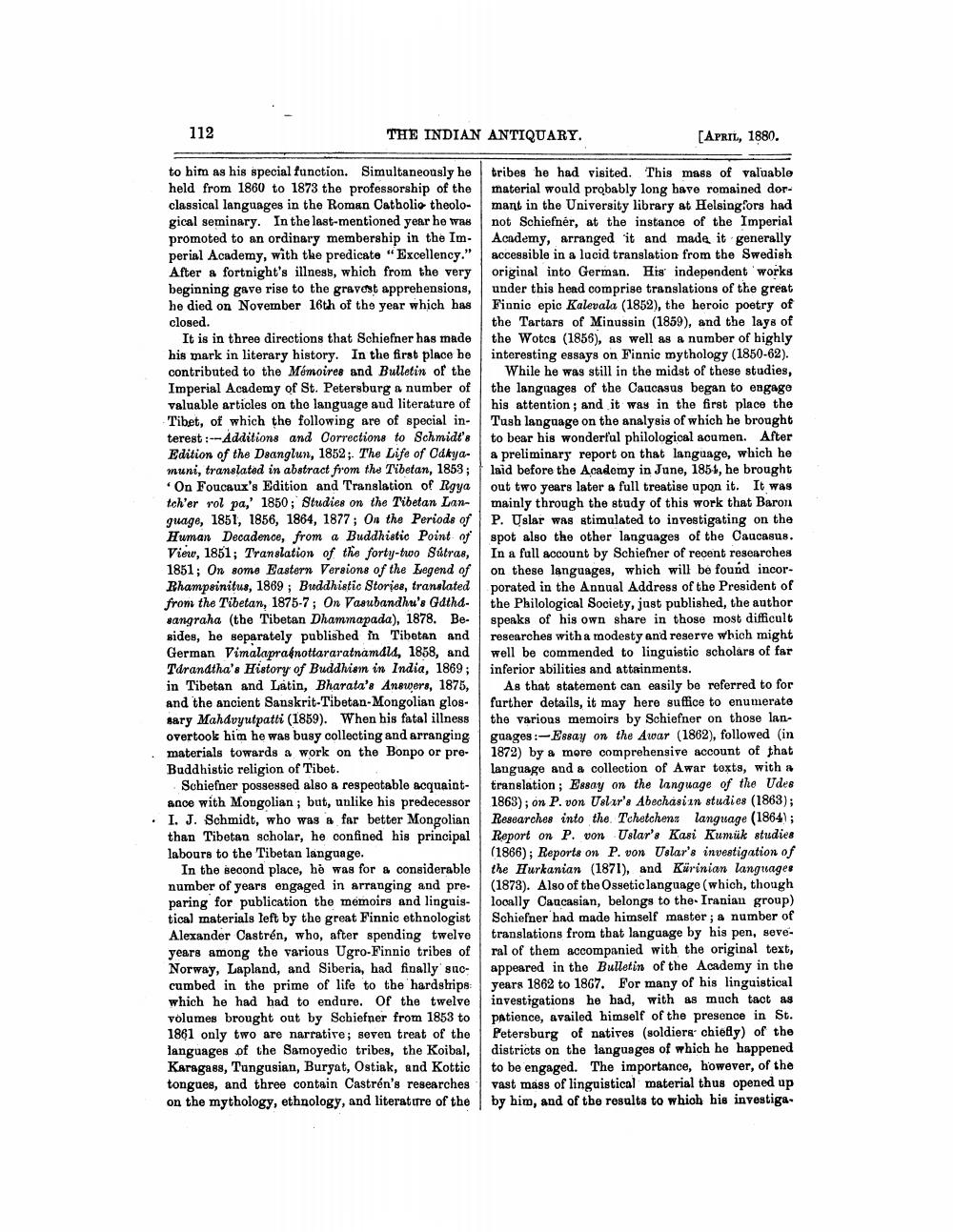________________
112
THE INDIAN ANTIQUARY.
[APRIL, 1880.
to him as his special function. Simultaneously he tribes he had visited. This mass of valuable held from 1860 to 1873 the professorship of the material would probably long have romained dorclassical languages in the Roman Catholio theolo- mant in the University library at Helsingfors had gical seminary. In the last-mentioned year he was not Schiefner, at the instance of the Imperial promoted to an ordinary membership in the Im- Academy, arranged it and made it generally perial Academy, with the predicate " Excellency." accessible in a lucid translation from the Swedish After a fortnight's illness, which from the very original into German. His independent works beginning gave rise to the gravost apprehensions, under this head comprise translations of the great he died on November 16th of the year which has Finnic epic Kalevala (1852), the heroic poetry of closed.
the Tartars of Minussin (1859), and the lays of It is in three directions that Schiefner has made the Wotcs (1856), as well as a number of highly his mark in literary history. In the first place be interesting essays on Finnic mythology (1850-62). contributed to the Mémoires and Bulletin of the While he was still in the midst of these studies, Imperial Academy of St. Petersburg a number of the languages of the Caucasus began to engage valuable articles on the language and literature of his attention, and it was in the first place the Tibet, of which the following are of special in-| Tush language on the analysis of which he brought terest:-- Additions and Corrections to Schmidt's to bear his wonderful philological acumen. After Edition of the Deanglun, 1852;. The Life of Odkya. a preliminary report on that language, which he muni, translated in abstract from the Tibetan, 1853; laid before the Academy in June, 1854, he brought
On Foucaux's Edition and Translation of Rgya out two years later a full treatise upon it. It was tch'er rol pa,' 1850 ; Studies on the Tibetan Lan- mainly through the study of this work that Baron guage, 1851, 1856, 1864, 1877; On the Periods of P. Uslar was stimulated to investigating on the Human Decadence, from a Buddhistic Point of spot also the other languages of the Caucasus. View, 1851; Translation of the forty-two Sútras, In a full account by Schiefner of recent researches 1851; On some Eastern Versions of the Legend of on these languages, which will be found incorRhampsinitus, 1869; Buddhistic Stories, translated porated in the Annual Address of the President of from the Tibetan, 1875-7; On Vasubandhu's Gathd- the Philological Society, just published, the author sangraha (the Tibetan Dhammapada), 1878. Be- speaks of his own share in those most difficult sides, he separately published in Tibetan and researches with a modesty and reserve which might German Vimalaprafnottararatnamdu, 1858, and well be commended to linguistic scholars of far Tdranatha's History of Buddhism in India, 1869; inferior abilities and attainments. in Tibetan and Latin, Bharata's Answers, 1875, As that statement can easily be referred to for and the ancient Sanskrit-Tibetan-Mongolian glos- further details, it may here suffice to enumerate sary Mahdvyutpatti (1859). When his fatal illness the various memoirs by Schiefner on those lanovertook him he was busy collecting and arranging guages :-Essay on the Awar (1862), followed (in materials towards a work on the Bonpo or pre- 1872) by a more comprehensive account of that Buddhistic religion of Tibet.
language and a collection of Awar toxts, with a Schiefner possessed also a respectable acquaint- translation; Essay on the language of the Udes ance with Mongolian; but, unlike his predecessor 1863); on P. von Uslar's Abechasian studies (1863); I. J. Schmidt, who was a far better Mongolian Researches into the Tchetchens language (1864); than Tibetan scholar, he confined his principal Report on P. von Uslar's Kasi Kumük studies labours to the Tibetan language.
(1866); Reports on P. von Uslar's investigation of In the second place, he was for a considerable the Hurkanian (1871), and Kürinian languages number of years engaged in arranging and pre- (1873). Also of the Ossetic language (which, though paring for publication the memoirs and linguis- locally Caucasian, belongs to the Iranian group) tical materials left by the great Finnic ethnologist Schiefner had made himself master; a number of Alexander Castrén, who, after spending twelve translations from that language by his pen, seveyears among the various Ugro-Finnio tribes of ral of them accompanied with the original text, Norway, Lapland, and Siberia, had finally sac- appeared in the Bulletin of the Academy in the cumbed in the prime of life to the hardships: years 1862 to 1867. For many of his linguistical which he had had to endure. Of the twelve investigations he had, with as much tact as volumes brought out by Schiefner from 1853 to patience, availed himself of the presence in St. 1861 only two are narrative; seven treat of the Petersburg of natives (soldiers' chiefly) of the languages of the Samoyedic tribes, the Koibal, districts on the languages of which he happened Karagass, Tangusian, Buryat, Ostiak, and Kottic to be engaged. The importance, however, of the tongues, and three contain Castrén's researches vast mass of linguistical material thus opened up on the mythology, ethnology, and literature of the by him, and of the results to which his investiga




